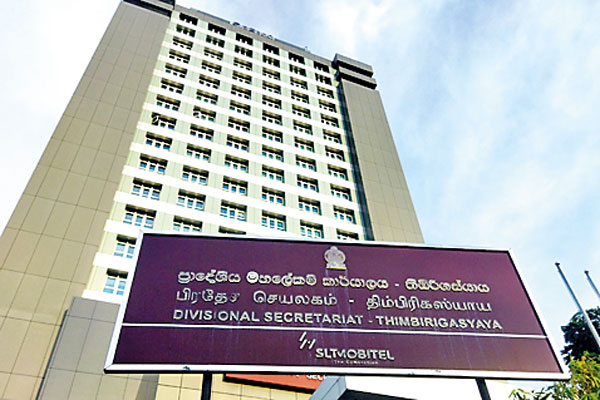News
Step on the law to ensure every candidate submits income and expenses report, says PAFFREL
View(s):- Points to the need for a more efficient system to monitor election expenditure
By Ishu Bandara
In the records of the Election Income and Expenses reports for the recently concluded parliamentary elections in the Colombo District, 882 out of 966 candidates successfully submitted their reports. Of these, 842 reports were physically handed in at the district offices, while 20 were submitted via registered post.

Colombo District Secretariat. Pic by Eshan Fernando
Colombo District Secretariat officials acknowledged that, as this is a newly introduced act, there might be discrepancies in its implementation. They noted that both candidates and the officials managing the process are still becoming familiar with its requirements.
One official mentioned that steps are being taken to address challenges arising from the large number of documents required to be filled by parties who wish to review the expenditure reports of political parties and candidates. The official admitted that handling such a volume of paperwork is practically challenging and time consuming, emphasising the importance of streamlining processes to improve efficiency and reduce delays.
When the Sunday Times reviewed the income and expense reports of two parties at the Colombo District Secretariat office, it revealed that the National People’s Power spent Rs. 74,293,045.26 on the election, while the Samagi Jana Balawegaya (SJB) reported expenditures of Rs. 35,970,099.56. The Election Commission set the maximum expenditure limit for a party in the Colombo District for the general elections at Rs. 79,473,756.00.
However, SJB’s report mainly highlighted advertising expenses, with minimal detail provided on other specific expenses required under the act, raising concerns about the completeness of their financial disclosure. However, during the process of collecting Income and Expenses reports, officials identified potential loopholes in the nomination process.
It was revealed that some nominees were unaware they were included in the list of candidates until they received letters requesting their income and expense reports. In one instance a person who went for a project in Polonnaruwa suddenly returned to Colombo after receiving calls from home, informing him that he had received a letter from the Election Commission asking for his election expenses report, even though he was not contesting in the election.
The inclusion of unwanted nominees in the candidates’ list, along with their names being printed on poll cards, contributes significantly to the overall expenses of conducting elections in Sri Lanka, which already cost billions of rupees. When considering the cumulative cost associated with processing even a single nominee, the financial impact becomes substantial. This issue will be magnified in the upcoming local elections, where the number of candidates is expected to rise from 8,888 in the general elections to around 80,000. Addressing and mitigating this issue in the upcoming elections could provide significant financial relief to the government. Talking to the Sunday Times regarding the practical issues of implementing the Election Expenditure Act, Rohana Hettiarachchi, Executive Director of People’s Action for Free & Fair Elections (PAFFREL), stated that more than 1,000 candidates had failed to submit their forms in the concluded general elections. He warned that, in the upcoming local elections, this number could rise to over 10,000 out of the 80,000 candidates. Mr. Hettiarachchi emphasised the need for an immediate change in the law, suggesting that candidates who fail to submit their election expenditure reports should be disqualified for three years by the Election Commission. He also proposed that the ECSL should be granted the authority to take legal action against such candidates.
“Now the police are required to submit their reports and then seek advice from the Attorney General’s Department. This process often results in unnecessary delays and increased costs. The back and forth between departments wastes valuable time and resources, hindering the efficiency of the legal and judicial system. Streamlining these procedures could save both money and time.” told Mr. Hettiarachchi.
Mr. Hettiarachchi also said that the Election Commission should have a structured system in place to monitor the entire election expenditure process. While acknowledging that such a mechanism might be costly, he stressed that its existence is essential to ensure transparency and accountability.
The Sunday Times inquired about the effectiveness of the process for collecting election income and expense reports from candidates. Manjula Gajanayake, Executive Director of IRES, suggested that, under the authority of the Election Commission, this process could be delegated to local universities. He proposed that it could be managed by intern students, provided they receive proper training beforehand.
“The manual system of collecting financial reports from candidates has certain issues, and a proper digital system needs to be introduced to address these challenges. University interns can be utilised to operate the system before the local government elections, as the number of candidates increases tenfold compared to parliamentary elections,” he stated.
The best way to say that you found the home of your dreams is by finding it on Hitad.lk. We have listings for apartments for sale or rent in Sri Lanka, no matter what locale you're looking for! Whether you live in Colombo, Galle, Kandy, Matara, Jaffna and more - we've got them all!

